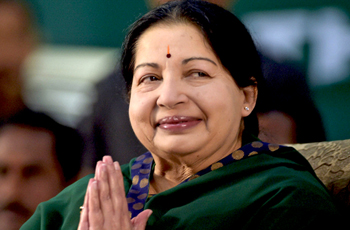Chennai, May 19: Claiming victory as trends gave her party a clear majority in the 234-member Tamil Nadu Assembly, AIADMK supremo and Chief Minister Jayalalithaa today termed the people's verdict as historic as against the "family rule" of DMK.
"This election has upheld true democracy shattering to pieces the campaign of lies of DMK. This election has put a permanent full stop to the family rule," she said in a statement as her party forged ahead in the counting of votes polled in the May 16 Assembly elections.
In the run up to polls, she had appealed to the people to vote against the family rule of DMK and support her party to nurture democracy.
Expressing her heartfelt thanks to the people, she said they have handed her party "a historic victory" by voting her back to power.
They had given her the honour of retaining power by an incumbent regime for the first time after 1984, she said.
AIADMK founder M G Ramachandran managed to successively win polls (1977-87) in Tamil Nadu and after that no other party managed to do it.
"There are no words in the dictionary to explain my sense of gratitude for the people of Tamil Nadu," Jayalalithaa, who took the gamble of virtually going it alone in the polls.
"I will forever be indebted to the people of Tamil Nadu who have reposed full faith on me and by making AIADMK emerge victorious in a big way," she said.
Vowing to fulfill all her electoral promises, 68-year old Jayalalithaa said she would work hard to make Tamil Nadu, the numero uno state in the country.
Thanking her party workers, and functionaries of alliance parties, she lauded them for working hard for the victory.
She also thanked the people of Puducherry and Kerala who voted for her party.






Comments
Congratulations Jayaji!
jayalalitha is very secular! Even if she allies with bjp after 2019 she won't allow bjp's communal politics in TN
Untill now even from MGR days no party won without any sort of alliance. Jayalalitha has created history in this win
Sun TV around 355 for trading gains. Jayalalitha won't shutdown SunTV
After MGR, jayalalitha is the only CM who won in a row.
jayalalitha won this election for more than vote against other parties(DMK)
Heavy win by Mamta & Jayalalitha in their states.Good to see BJP gaining vote % in WB & Kerala. BJP won their 1st MLA sit ever in Kerala !
Congratulations to Ms.Jayalalitha for the victory in Tamil Nadu. Under her leadership AIADMK has won the mandate of Tamil people.
Add new comment